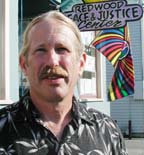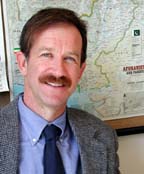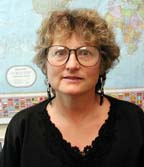|
Why do they hate us?A PERSISTENT QUESTION IN THE DAYS AND WEEKS after the Sept. 11 attacks was this: Why do they hate us? One year later, it's doubtful if too many Americans are still dwelling on that one. It's also doubtful -- given the horrific carnage that was wreaked -- if many ever really cared what the answer was. You certainly can make the case that the attacks were evil pure and simple, end of story. But those in the region who pay attention to the Middle East -- such as some Humboldt State University professors and a leader of a local peace group -- said recently that if we understand why the attacks took place, we may be better able to prevent another one from occurring. Some predicted that President Bush's military response to 9-11 -- and the possibility that the country may soon launch a war on Iraq -- will increase the likelihood that another major terrorist attack will take place on American soil. "Violence begets violence," warned Melanie Williams, a political science professor. "We will continue to not understand that these things will continue to come back at us." Williams said that the Sept. 11 attacks "were an international crime against humanity and should have been treated like a crime." The United States "should have used police skills, not the military," Williams added. She noted the possibility that Bin Laden and Mullah Omar, the head of the Taliban government, are both still alive and at large. "The blunt instrument of the military hasn't gotten us the ends we wanted."
Gayle Olson-Raymer, [photo below left] a historian of terrorism at Humboldt State, said that U.S. foreign policy is part of the reason America is hated in some quarters of the Muslim world.
The problem with that, she went on, is that most Muslims "see capitalism as diametrically opposed to their culture, religion and economic system. It's not popular." Blank pointed to the obvious: The United States is not liked in the Middle East because of its support for Israel. Blank, a fluent Arabic speaker who lived in Cairo in the 1970s and 1980s, said many Arabs believe they are victims of a double standard: Arab lives mean less than non-Arab lives to Americans. How else to explain the apparent American indifference -- and the widespread ignorance in this country -- to the appalling fact that an estimated 500,000 Iraqi children have died from diarrhea caused by bacterial infections since the country's water treatment systems were destroyed in the Gulf War more than 10 years ago? "The U.S. says `it's not our fault, Saddam is diverting money away [from fixing those systems], he's to blame.' But the fact of the matter is in the Arab world people blame us for that." Blank pointed to another perceived double standard: While the United States is threatening to go to war against Iraq because Saddam might have developed weapons of mass destruction, it is making no attempt to persuade Israel to give up its own nuclear arsenal. (While Israel is not officially considered a nuclear nation, Blank said it is an "open secret" that the country has the bomb). And then, of course, there's the massive military aid that America has provided to Israel -- to the tune of $3 billion a year. Blank pointed out that a recent Israeli missile attack on an apartment block in Gaza that killed the leader of Hamas, a Palestinian terror group, along with several other people, including women and children, was launched from an American-built F-16 jet fighter. "From the Arab perspective, it's a David v. Goliath situation and Israel is Goliath's client," Blank said. Blank stressed that he's not saying he agrees with such views; instead he says he emphasizes the Arab perspective so that his students can gain a better understanding of where Arabs are coming from. Olson-Raymer said she's restructured her classes since the attacks to emphasize how American foreign policy has influenced the world -- "so that my students can make better sense from the radical Islamicists' perspective about why 9-11 happened. "It's not to say that what they [radical Muslims] think is right, but instead to climb inside their minds to understand why [the hijackers] did what they did." Olson-Raymer said that when she first "brought up the other side, many students were angry. They didn't want to hear it." One student questioned her patriotism and suggested she "pack up and leave the country." She said she also got "hate e-mail." While feelings and interest in the Arab world ran high for several months following the attacks, by the end of the school year most students' minds were elsewhere. "By the end of May students were over it," Olson-Raymer said. "Few people were asking that many questions." Olson-Raymer criticized the attitude held by many following the attacks, and still emphasized by political conservatives, that if someone doesn't fully support everything the Bush administration has done since the attacks -- such as launching the war on terrorism -- they're unpatriotic. She said citizens' scrutinizing the government is the very definition of what it is to be American. "The Bush administration is not addressing the root causes of terrorism," which include poverty and inequity, Olson-Raymer said. "Instead [American offiicals] talk about the `axis of evil.' They don't talk about the fact that people who terrorize have themselves been terrorized or are the victims of some incredible life none of us could imagine." -- Keith Easthouse
PUBLISHER | IN THE GARDEN | CALENDAR Comments? E-mail the Journal: ncjour@northcoast.com © Copyright 2002, North Coast Journal, Inc. |

 David
Meserve of the Redwood Peace and Justice Center [photo at left] , agreed
with Williams that the Bush administration's war on terrorism
"has created more hatred for us." He also said 9-11
"has been seized upon [by the Bush administration] to launch
attacks on countries that are of strategic interest to us"
-- Afghanistan because of its proximity to China, "our next
competitor for world domination," and Iraq because of its
oil.
David
Meserve of the Redwood Peace and Justice Center [photo at left] , agreed
with Williams that the Bush administration's war on terrorism
"has created more hatred for us." He also said 9-11
"has been seized upon [by the Bush administration] to launch
attacks on countries that are of strategic interest to us"
-- Afghanistan because of its proximity to China, "our next
competitor for world domination," and Iraq because of its
oil. Paul
Blank [photo at right], a geography professor, said he finds it hard
to second-guess the bombing of Afghanistan. "It's a tough
one, but I think the administration had no choice but to respond
militarily."
Paul
Blank [photo at right], a geography professor, said he finds it hard
to second-guess the bombing of Afghanistan. "It's a tough
one, but I think the administration had no choice but to respond
militarily." "When
we go in to help people," Olson-Raymer said, "there's
always a price: `become our partners in capitalism.'"
"When
we go in to help people," Olson-Raymer said, "there's
always a price: `become our partners in capitalism.'"